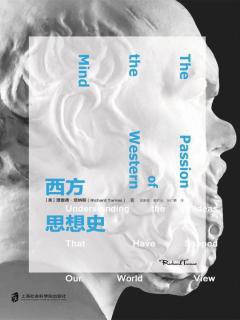
《西方思想史》西方思想简史
书名:西方思想史
1
0

春天大转变 2023-05-23 23:34:42
The Dual Legacy, adapted from The Passion of the Western Mind by Richard Tarnas.
The author summarizes the characteristics of classic Greek thought. As he concludes, it emerged from the archaic mythological consciousness, influenced by the mystery religion, forged through a dialectic with skepticism, naturalism, and secular humanism, and committed to reason, empiricism, and mathematics. According to the author, the Greeks identified the world as a question to be answered. The unique synthesis of Greek thoughts recognized the difference between phenomenal and the truth, recognized the connection between an ordered cosmos and human cognitive faculties. It is both ideal and rational. It combined secular skepticism and metaphysical idealism.
It is dual. It resulted from the complex interaction of two sets of assumptions and impulses. For the rational part, the author named a list a Presocratic philosophical tradition:
(1) Naturalistic empiricism from Thales;
(2) Rationalism from Parmenides;
(3) Mechanistic materialism from Democritus;
(4) Skepticism, individualism, and secular humanism from Democritus
The ideal part is visible in the Platonic synthesis. However, both shared an affirmation that "the final measure of truth was found not in hallowed tradition, nor in contemporary convention, but rather in the autonomous individual human mind."
The author reviewed that the two parts set an inner tension within the Greek inheritance, making it unstable yet highly creative, each undermining the others tendency to crystallize into dogmatism, and in combination elicited new and fertilized intellectual possibilities.
Vocabulary:
(1) Preceded adj. 之前的 (2) Conductive adj. 传导的 (3) Contemporaneous adj. 同时期的 (4) Empiricism n. 经验主义 (5) Tenet n. 教义 (6) Conviction n. 判定,坚定的信念 (7) Exert v. 实施 (8) Emanate v. 产生 (9) Immanent adj. 内在的 (10) Anthropomorphic adj. 拟人的 (11) Complementary adj. 互补的 (12) Antithetical 相反的,对立的 (13) Bifurcation n. 分歧 (14) Allegiance n. 拥护
相关推荐
萤火谷的梦想家
艾莉森•麦吉出生于1960年,是美国《纽约时报》畅销书作家,同时也是大都会州立大学创意写作课的教授。她的作品被翻译成20多种语言并出版,也曾被提名普利策奖,并获得苏斯博士奖金奖、克里斯托弗图书奖、美国 [美]艾莉森•麦吉/[美]克里斯托弗•丹尼斯/绘 2023-03-27 16:50:25鬼马女神捕1·绝密卧底(上)
腹黑凤凰vs毒舌鸡妖——蓝翎:“小姬,跟我去人界吧!”姬十四:“干吗?让人宰了我做小鸡炖蘑菇吗?”蓝翎:“不啊,让妖怪宰了你做小鸡炖蘑菇更气派。”凤凰蓝翎和鸡妖姬十四生活在无忧无虑的灵界。他们的故乡叫 郝天晓 2023-04-17 00:22:47© 2023-2025 百科书库. All Rights Reserved.












发表评价